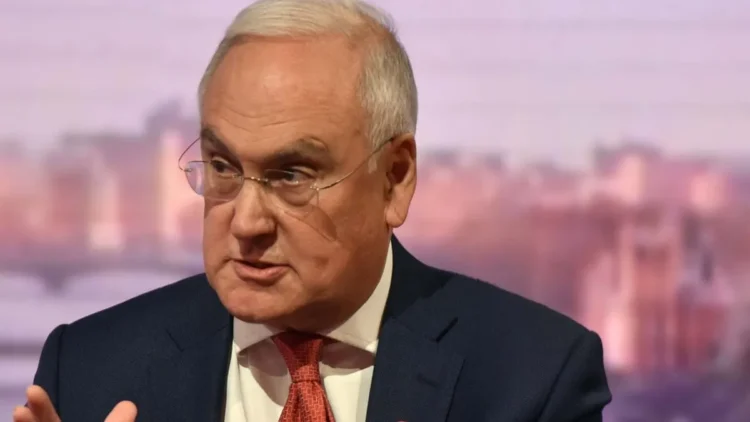By Gavin Mackintosh-
The credibility of the Office for Standards in Education, Children’s Services and Skills (Ofsted), the UK’s education watchdog, is under scrutiny following a scathing critique by its former chief inspector.
Sir Michael Wilshaw, who held the position until 2016, delivered a damning assessment of Ofsted’s school ratings, asserting that Ofsted’s claim that nearly 90% of state schools in England are “good” is “nonsense.”
Speaking before the Commons’ education select committee, Sir Michael Wilshaw raised significant concerns about the reliability of Ofsted’s single-phrase judgments, particularly the label “good,” which he believes provides parents with “false comfort” about the quality of their children’s education.
Wilshaw expressed his disbelief, saying, “Ofsted says that nearly 90% of schools are good – that’s nonsense, that’s complete nonsense.
‘Having seen some of the schools judged ‘good’ over the last few years, I would not say [they] were good.” His criticism extends to the inspection process, as he recounted his personal experiences, stating, “When I’ve been into some of these schools and then looked at the report, I’ve felt like going to Specsavers and getting another pair of glasses because they were not good.”
Sir Michael Wilshaw’s critique of Ofsted’s school ratings raises important questions about the effectiveness of the watchdog and the reliability of its assessments.
With nearly 90% of schools in England receiving the “good” rating, parents and educators alike may question whether this assessment truly reflects the state of education in the country.
To fully understand the implications of Wilshaw’s critique and the potential impact on Ofsted, it is essential to delve into the details of the issues raised and the broader context of education inspection in the UK.
Ofsted’s “Good” Rating: A Closer Look
Ofsted’s judgments play a crucial role in determining the quality of education provided by schools in England. Their ratings are widely publicized and hold significant weight, affecting school reputations, staff morale, and even property prices in the vicinity of highly-rated schools.
The rating “good” is a sought-after accolade for schools, indicating that they provide a high standard of education and overall effectiveness.
However, Sir Michael Wilshaw’s comments highlight a significant discrepancy. While the “good” rating may imply excellence, the former chief inspector’s observations suggest otherwise. This calls into question whether the ratings are an accurate reflection of the educational landscape in the country.
Ofsted’s Role and Influence
Ofsted was established in 1992 and has since become a powerful institution in the realm of education. Its primary role is to inspect and regulate schools, colleges, and other educational establishments to ensure high standards of quality and effectiveness.
The inspection process involves assessing various aspects of an institution, including leadership, teaching, curriculum, and the overall experience offered to students.
Ofsted’s judgments are eagerly awaited by schools, parents, and policymakers. The ratings, which range from “outstanding” to “inadequate,” guide educational priorities and shape government policy. Schools that receive a positive Ofsted rating often see increased applications and improved morale among staff.
The Broader Context of Education Inspection
Education inspection is not unique to the UK, as many countries worldwide have adopted similar systems.
The fundamental purpose of these inspections is to hold educational institutions accountable and ensure that they meet defined standards. Inspections can help identify areas that require improvement and drive enhancements in the education system.
However, the reliability and consistency of inspection systems have been debated for many years.
Critics argue that relying on a single inspection judgment to assess the quality of an educational institution may oversimplify a complex issue.
While some schools may excel in specific areas, they may have shortcomings that the inspection does not adequately address.
Sir Michael Wilshaw’s critique challenges the credibility of Ofsted and its school ratings, particularly the “good” label. His comments have sparked discussions about the accuracy of these assessments and whether they genuinely represent the quality of education in England.
If Ofsted’s ratings come under increased scrutiny, this could prompt a reevaluation of the inspection process and the criteria used to assess schools.
There may be calls for greater transparency and a more nuanced approach to inspections that consider a broader range of factors. Educators, parents, and policymakers may seek to ensure that assessments accurately reflect the realities of the educational landscape.
Additionally, the critique raises concerns about the potential impact on schools already rated as “good.” Schools that received this rating based on previous inspections may find themselves under increased pressure to maintain or enhance their performance.
The possibility of inspections becoming more rigorous and demanding could lead to additional stress for educators and school leaders.
Sir Michael Wilshaw’s comments have ignited a crucial debate about the reliability and accuracy of Ofsted’s school ratings. While the “good” rating has long been a source of pride for many institutions, it is essential to consider whether this rating reflects the true quality of education provided.




